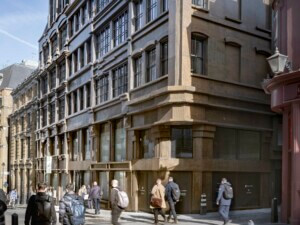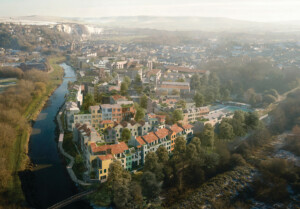It takes something of considerable magnitude to shift the global limelight from the U.S. presidential election. However, it appears Britain has done just that. The U.K. voted to leave the European Union and the largest trading bloc in the world, of which it has been a member for nearly half a century.
Economists and financial traders have frantically responded; The Architect’s Newspaper surveyed firms for their reactions and examined the outlook for the U.K. and Europe’s architecture scene. Before the vote, many of the leading U.K. architecture practices—including Thomas Heatherwick, David Adjaye and David Chipperfield, among others—all pledged their support for remaining in the European Union.
In terms of pure economics, share price fluctuation—notably of construction firms and developers—is one good indicator of industry confidence. When the market opened for the first time post-referendum, shares of Barratt Developments PLC, the biggest U.K. house builder by sales, fell as much as 32 percent, while shares of Persimmon PLC, which is the largest builder by market capitalization, dropped by 40 percent. Developers too were also wounded, with Derwent London dropping by 18 percent while British Land and Great Portland Estates saw share prices drop by 16 percent.
About a month prior to the referendum, architects and industry leaders held a panel discussion and came to the resounding conclusion that a “Brexit” would not be beneficial to the industry. David Green, director of Belsize Architects and former head of the European Division of the Bank of England, spoke of how procurement of labor and materials would be hindered by being outside the E.U., thereby inflating pricing.
He also added how the recognition of professional qualifications is “critical”; more decisions post-Brexit will be needed to set a common standard. The same quandary of materials standards would also apply. Jason Prior, chief executive of building and places at AECOM, commented that “Whether it be an Italian facade system or German tiles, those components can be used across the E.U. without any hinderance.”
As for now, the U.K. is still in the European Union, and the referendum was only advisory. Still, to reject the result would be politically challenging, if not impossible. The next step is to invoke Article 50, which essentially presses the red button on leaving the E.U. The process gives the U.K. two years to negotiate an exit deal. Provided that many of those who voted to leave cited immigration as their motivation, the free movement of people and labor may be tricky to maintain.
The British construction industry relies on Eastern European builders and tradesmen, coming most notably from Poland and Lithuania. David Thomas, chief executive of Barratt Developments, said “If you ask any house-builder what their main challenge is, they say it’s labor availability.” That labor supply, of course, could be maintained if Britain negotiates access to the single market (the European Economic Area) in an approach similar to Norway, whereby freedom of movement is still permitted.
Currently embroiled in the midst of a housing crisis, the U.K. government has been urged by the Federation of Master Builders (FMB) “to not turn off the free-flowing tap of European migrant workers;” the FMB added that twelve percent of British construction workers are of non-U.K. origin. “They have helped the construction industry bounce back from the economic downturn, when 400,000 skilled workers left the industry,” the FMB said.
Another complication of Britain’s impending withdrawal is that Scotland now has a strong mandate for a repeat referendum on their own independence. In 2014, 55 percent of voters from an 85 percent turnout chose not to leave. For the E.U. referendum, only 67 percent of the electorate turned out to vote, but should Scotland’s First Minister Nicola Sturgeon’s calls for independence be successful, England would lose a wealth of timber stock, notably Scots Pine, which could make meeting England’s housing demand even more tricky.
Former London Mayor and leading protagonist of the Leave campaign, Boris Johnson, has said that Article 50’s enactment “will not come in any great rush.” Johnson, who is the bookmaker’s favorite to be the next Prime Minister, also added that his only aim is for Britain to “extricate itself from the E.U.’s extraordinary and opaque system of legislation.” However, this notion was recently rebuffed by an E.U. diplomat who said “You cannot have your cake and eat it.”
Meanwhile, the Royal Institute of British Architects (RIBA) spoke of how architects bidding for public contracts in the E.U. would probably not be hindered. “For architects bidding for public contracts in the EU, no immediate changes are likely,” they said. “E.U. law expressly forbids any weight in a procurement decision being given to the country of origin of a bid for a public contract. As such, access to public contracts for U.K. bids is not dependent on the U.K.’s membership of the E.U.”
Here’s what some of the leading figures in Britain and Europe had to say on the referendum result:
Rogers, Stirk Harbour and Partners
“Where do we go from here?” Richard Rogers‘ practice has asked. “We now face a difficult period of great uncertainty. All those questions left hanging by those leading the drive towards leaving the EU will now have to be answered. This will take time (years) and in the interim requires great adaptability and resilience from us all.”
OMA
Renier de Graaf has said in a statement: “In a world where the most pressing issues inevitably exceed the size of nations, interdependence between nations is a fact. When problems escalate, so must inevitably the arena in which they are addressed. An institution like the E.U. is born out of the knowledge that in the face of the bigger issues we are all minorities. Countries in Europe have a choice: they can either realize or ignore the fact they are small. Yet small they are. All. Including Britain.”
Allies & Morrison
In a statement to The Architect’s Newspaper the firm said: “More than a quarter of our staff come from other E.U. countries. Over the course of our careers, we have enjoyed, been stimulated by and come to rely on their intelligence, broad education and warm experience. We remain committed to employing the best people from around the world.”
Co-founder Graham Morrisson said: “Over the course of our careers, we have enjoyed, been stimulated by and come to rely on the intelligence, broad education and warm experience of the many architects from the E.U. that we have had the privilege to employ.” Fellow co-founder Bob Allies, added: “More than a quarter of our staff come from the EU and the thought of losing that easy access to such a rich seam of talent is a consequence of the vote that will take a long time to adjust to.”
David Adjaye Associates
“We are truly disappointed with the outcome of the referendum,” said Adjaye’s office in a statement. As an increasingly international business, which benefits from a global pool of talent (and in particular from within the E.U.), we were hoping to remain.”
3D Reid
“I fail to see how the Leave vote can be a good thing, certainly in the short term, but the truth is we simply don’t know what this means in the long term,” said Graham Hickson-Smith, Director, 3D Reid. “The impact on sterling says it all. An out vote is bad for business.”
Skanska
Swedish construction firm Skanska issued a statement to AN: “Skanska acknowledges the choice made by the people of the U.K. to leave the European Union. Now the result is known, there will inevitably be a period of uncertainty as the country adjusts to the outcome of this very important decision. We will continue to assess the longer-term implications of the result on our business. However, we do not envisage any significant changes in the near future.”










